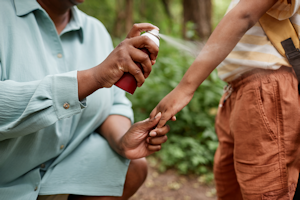Mosquitoes and Disease

Mosquitoes usually are seen as a nuisance, but they can sometimes spread diseases to people and animals. These diseases can cause illness and even death. While your chances of being infected with a disease through a mosquito bite are very small, some diseases spread by mosquitoes have increased in recent years. Climate change continues to increase the risk of diseases spread by mosquitoes, especially for people who travel to areas where they are more common. There are simple steps you can take to reduce your risk of being bitten.
How to Prevent Mosquito Bites
Preventing mosquito bites is the most important way to reduce your risk of getting a disease that is spread by mosquitoes.
Protect yourself:
- Cover your skin as completely as possible when outside at sunrise, sunset, and early in the evening when mosquitoes are most active. Wear long sleeves, pants, and socks.
- Use insect repellent on exposed skin and follow label directions and this information on using repellents safely. More information on choosing and safely using repellents is on the U.S. Environmental Protection Agency website.
- Cover strollers and baby carriers with mosquito netting.

Reduce the number of mosquitoes around your home and property:
Make sure there are screens in your home's windows and doors. Make sure the screens do not have rips, tears, or holes.
Eliminate all standing water on and around your home and property where mosquitoes can reproduce by taking these steps:
- Throw out tin cans, plastic containers, ceramic pots, or similar water-holding containers.
- Get rid of used tires. Call your local landfill or Department of Public Works to find out how to get rid of used tires properly.
- Drill holes in the bottoms of outdoor recycling bins so they can completely drain.
- Clean clogged roof gutters and make sure they drain properly.
- Remove leaves and other yard waste from yards, gardens, and edges of pools.
- Drain areas where water collects on the ground and fill with dirt or add landscaping.
- Turn over wading pools and wheelbarrows when not in use.
- Change the water in birdbaths twice a week.
- Clean and put chlorine in swimming pools, outdoor saunas, hot tubs, and water fountains.
- Drain water from pool covers.
Frequently Asked Questions
Statewide Mosquito-borne Disease Activity Report
More Information
- Chikungunya
- Dengue Fever Frequently Asked Questions
- Eastern Equine Encephalitis Frequently Asked Questions
- Oropouche Virus Frequently Asked Questions
- West Nile Virus Frequently Asked Questions
- West Nile Virus Information for Outdoor Workers
- Do Mosquitoes Love Your Home and Yard?
- Repellents and Pesticides
- About Mosquito Bites (CDC)
- Preventing Mosquito Bites (CDC)
Publications
- Tick- and Mosquito-borne Diseases Publications Reference Guide
- Mosquito-borne Diseases Materials Order Form (PDF)
If you have additional questions, contact your local health department or email the New York State Health Department at bcdc@health.ny.gov.